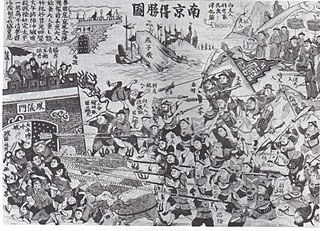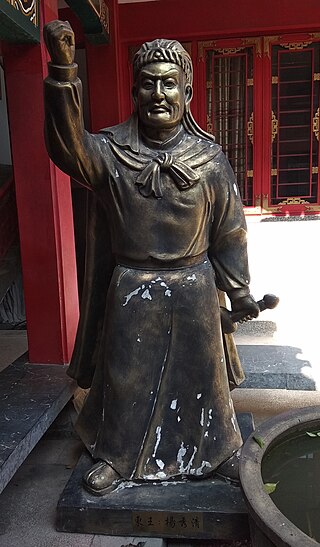
The Taiping Rebellion, also known as the Taiping Civil War or the Taiping Revolution, was a civil war in China between the Manchu-led Qing dynasty and the Hakka-led Taiping Heavenly Kingdom. The conflict lasted 14 years, from its outbreak in 1850 until the fall of Taiping-controlled Nanjing—which they had renamed Tianjing "heavenly capital"—in 1864. However, the last rebel forces were not defeated until August 1871. Estimates of the conflict's death toll range between 20 and 30 million people, representing 5–10% of China's population at that time. While the Qing ultimately defeated the rebellion, the victory came at a great cost to the state's economic and political viability.
Hong Xiuquan, born Hong Huoxiu and with the courtesy name Renkun, was a Chinese revolutionary and religious leader who led the Taiping Rebellion against the Qing dynasty. He established the Taiping Heavenly Kingdom over large portions of southern China, with himself as its "Heavenly King".

The Third Battle of Nanjing in 1864 was the last major engagement of the Taiping Rebellion in the Qing Empire. With the fall of Nanjing, the capital of the Taiping Heavenly Kingdom, the rebellion came to an end. The Hunan Army, an unpaid and barely fed militia commissioned by the Qing Empire, lost all their discipline and committed mass-scale random murder, wartime rape, looting and arson against the civilians of Nanjing, seen as "rebels". 200,000–300,000 "rebels" were reported dead by Zeng Guofan, the commander-in-chief of the Hunan Army.

Yang Xiuqing, was an organizer and commander-in-chief of the Taiping Rebellion.

The Jintian Uprising was an armed revolt formally declared by Hong Xiuquan, founder and leader of the God Worshippers, on 11 January 1851 during the late Qing dynasty of China. The uprising was named after the rebel base in Jintian, a town in Guangxi within present-day Guiping. It marked the beginning of the Taiping Rebellion.
Chen Yucheng, born Chen Picheng, was a Chinese general during the Taiping Rebellion and later served as the Heroic (Ying) Prince of the Taiping Heavenly Kingdom in the later stages of the rebellion, nicknamed "Four-eyed Dog" because of two prominent moles below his eyes.

Xiao Chaogui was an important leader during the early years of the Taiping Rebellion against the Qing dynasty of China. He was a sworn brother to Hong Xiuquan, the leader of the Taipings, and claimed to serve as a mouthpiece for Jesus Christ. Because of his importance to the rebellion, he was awarded the title of the "West King."

Feng Yunshan was the South King of the Taiping Heavenly Kingdom, a distant cousin and early accomplice of Hong Xiuquan, and an important leader during the Taiping Rebellion against the Qing government. He was one of the first Taipings to be baptized and established the first group of God Worshippers during the 1840s. He was killed during the initial stages of the rebellion, prior to the establishment of the Taiping's capital of Tianjing at Nanjing.

Wei Changhui was the North King of the Taiping Heavenly Kingdom during the Taiping Rebellion.
The Battle of Jiangnan (1860), also known as the Second rout of the Jiangnan Battalion took place between the Qing government's Green Standard Army and the army of the Taiping Heavenly Kingdom during the Taiping Rebellion. The Green Standard Army twice attempted to besiege Nanjing, capital of the Taiping Heavenly Kingdom, but was unable to break through. To break the siege of Nanjing, the Taiping forces maneuvered to divert Qing forces by sacking Hangzhou, before quickly moving back to Nanjing to counter-encircle the Qing siege forces and routing the Green Standard Army garrison completely, breaking the siege of Nanjing.
The Battle of Shanghai (太平軍二攻上海) was a major engagement of the Taiping Rebellion that occurred from June 1861 to July 1862. British and French troops used modern artillery on a large scale for the first time in China. Cannon fire inflicted heavy casualties on the Taiping forces, whose commander Li Xiucheng was wounded in the left leg by a shot fired from a cannon.

The Taiping Heavenly Kingdom, or the Heavenly Kingdom of Great Peace (1851–1864), was a theocratic monarchy which sought to overthrow the Qing dynasty. The Heavenly Kingdom, or Heavenly Dynasty, was led by Hong Xiuquan. Its capital was at Tianjing, present-day Nanjing. The unsuccessful war it waged against the Qing is known as the Taiping Rebellion.

The God Worshipping Society was a religious movement founded and led by Hong Xiuquan which drew on his own unique interpretation of Protestant Christianity and combined it with Chinese folk religion, based on the faith in Shangdi, and other religious traditions. According to historical evidence, his first contact with Christian pamphlets occurred in 1836 when he directly received American Congregationalist missionary Edwin Stevens' personal copy of the Good Words to Admonish the Age. He only briefly looked over and did not carefully examine it. Subsequently, Hong claimed to have experienced mystical visions in the wake of his third failure of the imperial examinations in 1837 and after failing for a fourth time in 1843, he sat down to carefully examine the tracts with his distant cousin Feng Yunshan, believing that they were "the key to interpreting his visions" coming to the conclusion that he was "the son of God the Father, Shangdi, and was the younger brother of Jesus Christ who had been directed to rid the world of demon worship."
Franz H. Michael (1907–1992) was a German-born American scholar of China, whose teaching career was spent at University of Washington, Seattle, and at The George Washington University in Washington, D.C. Michael's research began with publications concerning the Manchus in China, the Qing dynasty and the Taiping Rebellion against it. He also studied Tibet and Inner Asia, and the tradition of authoritarian government in China, including the People's Republic of China. The themes of despotism, cultural synthesis or assimilation, and the modern fate of Confucian humanism shaped the choice of topics in Michaels' academic work and public advocacy, and his experience in 1930s Germany directly influenced his anti-totalitarian and anti-communist stance.
The Northern Expedition was a failed campaign by the Taiping Heavenly Kingdom against the Qing dynasty during the Taiping Rebellion. Its purpose was to capture Beijing and then complete an encirclement of northern and western China. Launched in May 1853, the Northern Expedition would travel from Jiangsu to Zhili before being destroyed in early 1855.
Li Kaifang was a military leader of the Taiping Rebellion from Luchuan, Guangxi, China. In 1851, he was promoted to the rank of corps superintendent. While campaigning in Hunan in 1852, he was promoted three times, rising to the rank of commander. After helping to capture Wuchang and Hanyang in Hubei, he was ultimately named chief chancellor of the Earth Department. Along with Lin Fengxiang, Li lead the Taiping vanguard during the march toward Nanking and occupied Yangzhou in April 1853. Both would also lead the ill-fated Northern Expedition. Li was captured on March 31, 1855 in Fengguantun, Shandong. Li was then executed by lingchi at the Caishikou Execution Grounds.
Jiang Zhongyuan, courtesy name Changrui, (常孺) was a scholar and soldier from Hunan who fought for the Qing and against the Taiping Heavenly Kingdom during the Taiping Rebellion.
The Western Expedition was a campaign by the Taiping Heavenly Kingdom against the Qing dynasty during the Taiping Rebellion.
Events that took place from 1848, in China.
Events from the year 1847 in China.








